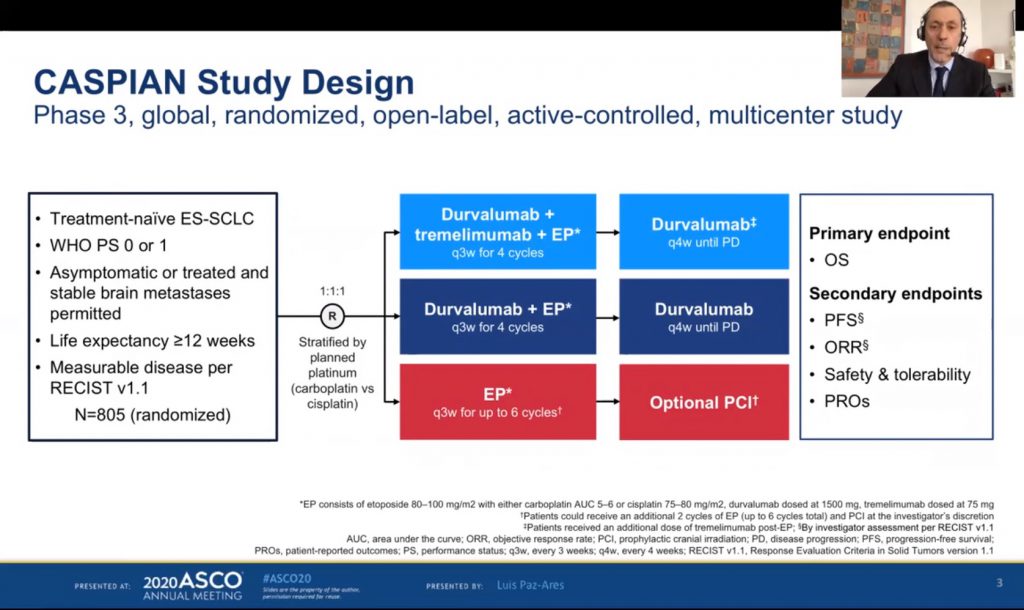Featured video: Final survival results from SPARTAN, a phase III study of apalutamide (APA) versus placebo (PBO) in patients (pts) with nonmetastatic castration-resistant prostate cancer (nmCRPC).
In the phase 3 SPARTAN trial, the addition of apalutamide to androgen-deprivation therapy (ADT) improved median metastasis-free survival (MFS) and progression-free survival (PFS) in non-metastatic castration-resistant prostate cancer (nmCRPC), compared with placebo [1]. Now, overall survival data are mature, and this was also significantly improved in patients treated with apalutamide.ADT is the mainstay of treatment for metastatic prostate cancer. ADT is also an important part of care for many men with non-metastatic prostate cancer. However, although ADT is initially effective, castration-resistant disease eventually develops in almost all men with prostate cancer.
The phase 3 SPARTAN trial evaluated the effect of adding the non-steroidal anti-androgen agent apalutamide to ADT in patients with nmCRPC. A total of 1,207 patients were 2:1 randomised to apalutamide (240 mg once daily) or placebo. At the primary endpoint analysis, apalutamide showed to significantly improve median MFS (40.5 months vs 16.2 months; HR 0.28; 95% CI 0.23-0.35; P<0.001), as well as median PFS (40.5 months vs 14.7 months; HR 0.29; 95% CI 0.24-0.36; P<0.001) compared with placebo [1]. Based on these primary study results, apalutamide was approved by the US FDA in February of 2018 for the treatment of men with nmCRPC.
After the primary efficacy endpoint of SPARTAN was met, the study was unblinded and eligible placebo patients crossed over to receive open-label apalutamide. In total, 76 patients in the placebo arm (19%) crossed over to apalutamide. After a median follow-up of 52 months and with 100% of the events required, the results of the secondary endpoint overall survival are mature. Apalutamide increased overall survival from 59.9 months to 73.9 months (HR 0.78; 95% CI 0.64-0.96; P=0.016) [2]. The improvement in overall survival was observed despite a high rate of subsequent active therapy, with 70% of placebo patients receiving life-prolonging therapy upon progression. Apalutamide also significantly delayed time to chemotherapy (HR 0.63; 95% CI 0.49-0.8; P=0.0002) as well as median time to PSA progression (40.5 months vs 3.7 months; HR 0.07; 95% CI 0.06-0.09; P<0.0001).
With substantially longer follow-up, the overall distribution of adverse events over time was stable and the safety profile of apalutamide was unchanged from the prior interim analysis.
- Smith MR, et al. N Engl J Med. 2018; 378: 1408-1418.
- Small EJ, et al. ASCO Virtual Meeting, 29-31 May 2020, Abstract 5516.
Posted on
Previous Article
« Novel drug for kidney cancers/VHL patients Next Article
ARAMIS final OS and nmCRPC safety outcomes »
« Novel drug for kidney cancers/VHL patients Next Article
ARAMIS final OS and nmCRPC safety outcomes »
Table of Contents: ASCO 2020
Featured articles
COVID-19 & Telemedicine
COVID-19 and Cancer Consortium Registry: initial results
Oncology hospital-at-home model reduces hospitalizations, emergency department visits, and costs
Nurse-led telephone triage system reduces hospitalizations, helps patients manage symptoms at home
Melanoma
Adjuvant pembrolizumab: durable RFS for stage III melanoma
Adjuvant pembrolizumab: durable RFS for stage III melanoma
Pembrolizumab plus low-dose ipilimumab well tolerated after progression on PD1 antibody therapy
Toripalimab plus axitinib effective in metastatic mucosal melanoma
Breast & Ovarian Cancer
Advanced breast cancer: locoregional therapy does not improve OS
T-DM1 does not improve safety or efficacy in HER-2 positive early breast cancer; favorable iDFS reported
Maintenance olaparib improves OS in relapsed ovarian cancer with BRCA1/2 mutation
Combination pembrolizumab/chemo improves PFS in metastatic TNBC
Effect of veliparib with or without cisplatin in breast cancer: results of SWOG S1416
PHOEBE, a phase 3 trial comparing pyrotinib and lapatinib in HER2-positive metastatic breast cancer
BYLieve demonstrates efficacy of PIK3CA-directed treatment post CDK4/6-ihibition
Strategies emerge for chemotherapy de-escalation in HER2-positive breast cancer
Multiple Myeloma
Carfilzomib: no PFS benefit for multiple myeloma
Lung Cancer
ES-SCLC: tremelimumab + durvalumab + chemotherapy misses endpoint
Adjuvant osimertinib in NSCLC: practice changing ADAURA trial
ES-SCLC: pembrolizumab KEYNOTE-604 data
Second-line gemcitabine plus ramucirumab significantly improves overall survival
Tiragolumab and atezolizumab: ORR in NSCLC
MET-amplified advanced NSCLC responds well to MET inhibitor capmatinib
Genitourinary Cancer
Urothelial cancer: avelumab works as maintenance therapy
ARAMIS final OS and nmCRPC safety outcomes
Final survival results from phase 3 SPARTAN trial
Novel drug for kidney cancers/VHL patients
Primary analysis from IMvigor010, adjuvant atezolizumab in high risk muscle-invasive urothelial carcinoma
First randomised trial of Lu-PSMA in mCRPC progressing after docetaxel
Gastrointestinal Cancer
HER2-expressing metastatic colorectal cancer: trastuzumab deruxtecan
REGOMUNE: a phase 2 study combining regorafenib and avelumab
Cardiotoxicity: consider switching to S-1
Perioperative chemotherapy for resectable pancreatic ductal adenocarcinoma
Real-world data of sequential sorafenib followed by regorafenib in unresectable HCC
Paediatric Cancer
Sustained improvements in quality of life with larotrectinib
Promising first immunotherapy trial in placental trophoblastic tumours
Precision medicine for poor-prognosis paediatric patients
Related Articles
September 17, 2020
ARAMIS final OS and nmCRPC safety outcomes

September 8, 2020
ES-SCLC: tremelimumab + durvalumab + chemotherapy misses endpoint
© 2024 Medicom Medical Publishers. All rights reserved. Terms and Conditions | Privacy Policy
HEAD OFFICE
Laarderhoogtweg 25
1101 EB Amsterdam
The Netherlands
T: +31 85 4012 560
E: publishers@medicom-publishers.com

